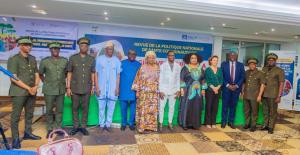A Review of the National Community Health Policy to strengthen gains and accelerate reforms
From 15 to 18 July 2025, the national review workshop of the National Community Health Policy (PNSC) provided a platform for exchange aimed at assessing the implementation of the policy and setting the priority directions for the years ahead. Organized by the Ministry of Health with support from UNICEF, WHO, the U.S. Government, WAHO and other partners, the meeting brought together institutional actors, local authorities, community organizations and the entire network of technical partners involved in the initiative.
Adopted in 2020 to bring health services closer to populations, the PNSC relies on the work of Community Health Workers and Qualified Community Health Workers (ASCQ). After two years of effective implementation, stakeholders unanimously recognized its positive impact in the areas where the policy has been deployed. Beneficiary communities have seen clear improvements in several indicators, including vaccination, hygiene practices, care-seeking behavior, access to essential services and early referrals. These results demonstrate the relevance of a model built on proximity and active community engagement.
Operationally, the policy is supported by a total budget of 86 billion CFA francs, of which 66.6 billion have already been mobilized. Its rollout followed three successive phases including pilot, extension, and nationwide expansion leading to a national coverage today. Benin now counts 15,547 Community Health Workers, 566 ASCQ and 19 focal points in place, although some positions still need to be filled, and certain training sessions finalized.
Despite these achievements, the review highlighted several challenges. Discussions pointed to the need to strengthen the quality of services, supervision, digitalization, transparency in payments, and the collection and use of data. Participants also stressed the importance of further involving One Health actors to ensure an integrated and resilient approach across all levels of the health system. Ensuring the sustainability of the policy through a balanced and durable financing model also remains a central concern.
The WHO Representative, and Lead Coordinator of the Health Technical and Financial Partners (PTFs), Dr. Kouamé Jean Konan, praised Benin’s leadership. “Community health is now a pillar of health governance, and this vision deserves our admiration and our support,” he noted, adding that the Local Component of the Health System (CoLoSS) represents a breakthrough in the region. He emphasized the need for a strong policy framework, qualified human resources, a reliable information system and active citizen participation, stating that “strengthening community health means preparing the system for crises and ensuring health for all, including the most isolated populations.”
Speaking on behalf of UNICEF, Dr. Mariam Sylla recalled that “community health is one of the most powerful levers for ensuring that children, adolescents and families have equitable access to essential services, wherever they live.” The PNSC is funded by UNICEF, the U.S. Government and several other international partners, in co-financing with the Government of Benin.
The second part of the review featured the national restitution day, held on 18 July and bringing together more than 300 participants. This high-level dialogue, involving members of government, local authorities, One Health experts and technical and financial partners, validated the recommendations from the technical sessions and reaffirmed the collective commitment to scaling up the PNSC in a coordinated manner. Alongside the Minister of Health, several members of government—including the Ministers of Agriculture and Decentralization reiterated that community health remains a strategic priority of the Government Action Programme (PAG 2021–2026) to help the country move towards universal health coverage.
One of the major achievements of the review was the adoption of an operational guide that clearly defines the roles of all actors, from the community level to national decision-making bodies. This document provides a methodological framework to harmonize practices and ensure consistency in interventions across the country.
The exchanges also led to the development of a clear roadmap for the coming years, outlining follow-up of key recommendations, dissemination of the validated guide, preparation of the 2025–2030 strategic plan, structured resource mobilization, strengthened implementation monitoring and systematic documentation and sharing of best practices.
